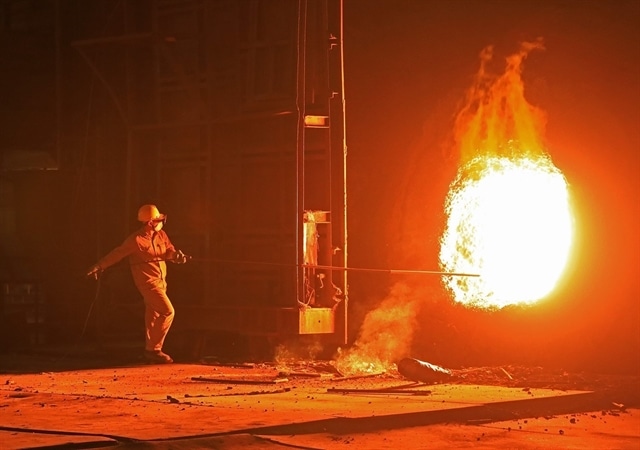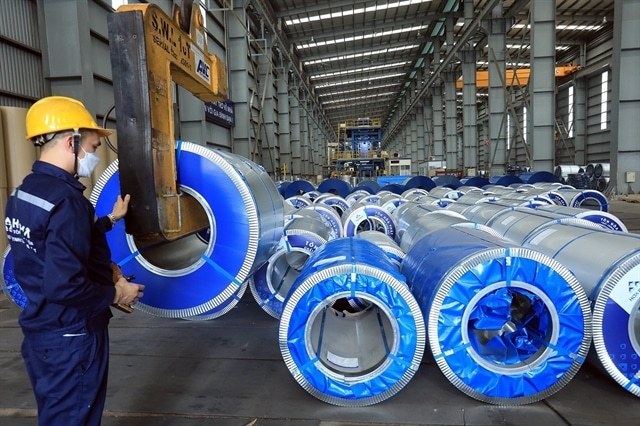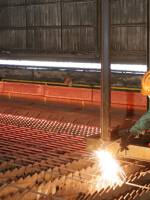
Việt Nam needs to develop a roadmap towards decarbonisation for the iron and steel industry to enhance competitiveness and capture opportunities from the UK – Việt Nam Free Trade Agreement (UKVFTA) to expand export to this market in the context of the UK seeking to address carbon leakage risk.
Early this year, the UK Government launched a consultation on addressing carbon leakage risk to support decarbonisation through a range of proposed policy measures including a carbon border adjustment mechanism (CBAM), mandatory product standards (MPS) on embodied emissions, and others designed to boost demand for low carbon products and emissions reporting.
According to accounting and auditing services firm KPMG, the proposed UK CBAM would apply a carbon price to UK imports with high embodied emissions and was expected to apply to highly carbon-intensive sectors such as cement, chemicals, iron and steel, paper and pulp, glass, refining and fertiliser.
The EU CBAM entered into application in its transitional phase on October 1 and would extend through 2025. This climate measure will officially take effect in 2026 and be fully operational in 2034.
In the transitional phase, traders will only have to report on the emissions embedded in their imports subject to the mechanism without paying any financial adjustment.
However, starting from 2026, some reports suggest that the EU CBAM would translate into 20-35 per cent tax on imports into the EU starting from 2026.
The iron and steel industry is one among six sectors covered by the EU CBAM in its first phase, besides cement, aluminium, fertilisers, electricity and hydrogen.
The UK Government’s consultation covered the iron and steel industry.
Steel is one of the most widely used materials in the world and its production accounted for around 7-8 per cent of global emissions, making steel one among the top three industries with the highest levels of emissions besides chemicals and cement.
An estimation by the World Trade Organisation showed that the global steel export value could decrease by around 4 per cent under the impact of CBAM.
Việt Nam Steel Association initially estimated that CBAM would reduce the annual gross domestic product (GDP) of Việt Nam by about US$100 million on average, not significant compared to the economy scale of $400 billion.
However, similar mechanisms were brewing in many countries such as the UK, the US, Australia and Canada, which would have long-term impact on the entire economy, the associations said.
Greening: a must

CBAM presented challenges, but also a push to the steel industry towards greening its production to enhance competitiveness and expand exports.
Although timelines for the implementation of the UK CBAM are still to be determined, the transitional phase of the EU CBAM would give time for Vietnamese steel makers to prepare.
According to Việt Nam Steel Association, the steel industry still had a high emission level, the equivalent of around 3.5 billion tonnes of carbon each year, accounting for about 7-9 per cent of the country’s total emissions and 45 per cent that of industrial production.
An estimation by Energy Conservation Research and Development Centre (Enerteam) showed the average emission level of Việt Nam’s steel industry is 2.51 tonnes of CO2 per tonne of raw steel, compared to the world average of 1.85 tonnes.
Đỗ Nam Bình from the Ministry of Industry and Trade’s Việt Nam Industry Agency said that many steel factories in Việt Nam had outdated technology and were of small scale with capacity of less than 500,000 tonnes per year that consumed a lot of energy and caused pollution.
Decarbonisation became vital for the steel industry to enhance competitiveness, Bình said.
According to the Việt Nam Steel Association, developed economies were stepping up the green development roadmap which was posing challenges to Việt Nam’s steel export. Việt Nam also committed to be carbon neutral by 2050.
Admitting that Việt Nam’s steel production was behind the world in terms of technology, going green was a long road which would require financial resources, preparations and a roadmap for decarbonisation, the association said.
According to Nguyễn Cảnh Cường, Vietnamese Trade Counsellor to the UK, CBAM would not have significant impact on trade in the transitional phase which would run until January 1, 2026.
However, the transitional phase of the EU CBAM is time for carbon-intensive industries, including steel, to implement green transition and decarbonisation to enhance competitiveness in the long run, he said, pointing out that the taxes translated from CBAM from 2026 would undermine Việt Nam’s competitiveness from low energy prices and environmental protection costs.
He said the effectiveness of FTAs would decline on the export of carbon-intensive industries, urging steelmakers to speed up energy transition and apply decarbonisation technology in production to be able to take the opportunities from trade deals.
The UKVFTA enlarged the way for Việt Nam to expand the export of steel and iron products to the UK through trade liberalisation.
Steel and iron were among products registering the fastest growing exports to the UK since the trade deal came into effect on May 1, 2021. The Ministry of Industry and Trade showed that Việt Nam’s steel and iron exports to the UK increased by 1,269 per cent in 2021.
To further capitalise on the opportunities from the UKVFTA, quick decarbonisation of the operation of the steel industry was a must.
Việt Nam takes initial steps to develop a decarbonisation roadmap for the steel industry.
Accordingly, the 2021-25 period would focus on optimising the process, energy, raw material and technology to reduce 10-30 per cent of emissions. The 2025-30 period would use low-carbon materials and increase the use of H2 in steel production in line with the global trend.
Việt Nam’s plan of developing the carbon credit market was also expected to accelerate the green transition of the steel industry and other carbon-intensive industries, contributing to the goal of achieving net zero by 2025
In the short and medium terms, CBAM created significant challenges to the export of steel and iron products, according to Phạm Quang Anh, director of the Mercantile Exchange of Việt Nam’s Information Centre. However, in the long term, greening production would be the opportunity for Việt Nam to improve product quality to meet international standards and sustainable development requirements, he said.
(VNS)




